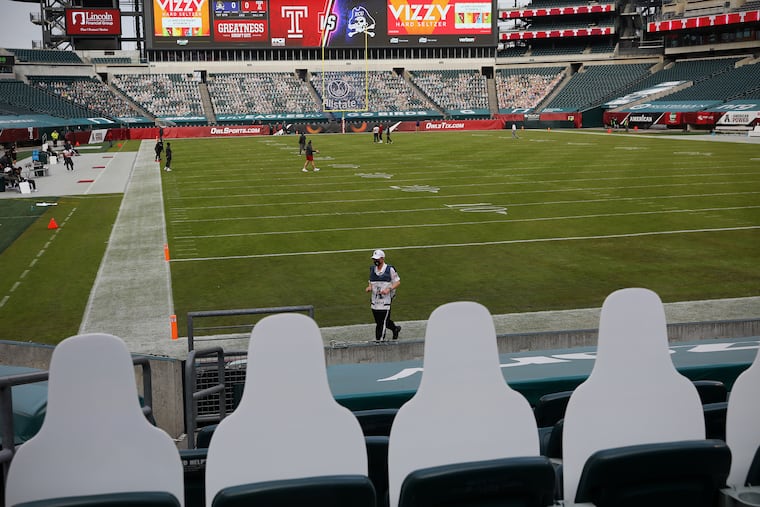Temple athletics staffers share their plans for COVID-19 vaccinations, testing and more
The university has set an Oct. 15 deadline for all students, faculty and staff to to be fully vaccinated.

Temple University has set an Oct. 15 deadline for all students, faculty and staff to be fully vaccinated against COVID-19.
The announcement came after the City of Philadelphia implemented a new mandate stating all health-care workers, faculty and students of local colleges and universities need to be fully vaccinated or wear masks while indoors and get tested for COVID-19 at least once per week.
Temple athletics is required to follow university policies, which means all student-athletes and coaches are obligated to receive the vaccine unless they have a medical or religious exemption. Athletes and staff are about 80-85% vaccinated at the moment, said Kevin Addison, Temple’s associate director of athletic training. A mask mandate also will apply to all athletes when indoors.
While Temple’s athletic trainers continue to educate athletes and staff on the benefits of the vaccine, those who remain unvaccinated will abide by Philadelphia, NCAA and AAC COVID-19 procedures.
That education process started in earnest last season when players were required to have a nose swab and health check-in before class as part of their daily routine. It continued when they arrived to campus for training camp and received a single polymerase chain reaction or nucleic acid amplification test within five days of arrival.
» READ MORE: Villanova’s Jay Wright loved his Team USA men’s basketball Olympic experience — but it wasn’t always fun
This year vaccinated athletes will only receive testing if they show symptoms or have a documented close contact, according to the NCAA. But unvaccinated players will receive a PCR test three days before competition or an antigen test within one day of competition. If a community spread is substantial or high, those athletes will take a weekly polymerase chain reaction test or an antigen test three times a week.
“[Philadelphia’s] city guidance right now is three times a week that they have to be tested, and the university is two times a week when you’re coming onto campus,” said Jessica Reo, executive senior associate athletic director. “Right now, our non-vaccinated people are getting tested three times per week.”
Temple’s athletic trainers handled testing last season, monitoring health and positive cases for all student-athletes. With vaccination rates going up, the athletic department will now shift that responsibility and utilize on-campus resources for unvaccinated players who need testing.
“With the number of student-athletes that we have that are vaccinated, and the staff that we have that are vaccinated right now,” Reo said, “we’ve been able to redirect some of that tracking and stress into care for our student-athletes.”
Addison’s staff met with Temple’s athletes in the spring and left them with a piece of paper providing background information on vaccine availability.
In early August, Addison’s staff emphasized hygiene and social distancing in talks with athletes, and reminded them to avoid compromised situations.
“We were able to kind of keep track of the percentage of each team that was vaccinated and we will reach out to those people who aren’t vaccinated,” Addison said, “because they know what’s going on in the city is required.”
The NCAA and AAC will maintain the same quarantine procedures, but if a vaccinated athlete comes in contact with a positive person they’ll continue practicing.
“They will have to be tested within three to five days of that exposure, so then they still can practice, they should be masked at all times other than when they’re practicing,” Reo said “If they are positive, then they go into isolation, just like normal, and they have to be in isolation for 10 days.”
Reo said the goal is for student-athletes to take the initiative and communicate with their coaches if they aren’t feeling well.
Temple athletics’ motto was flexibility last season, and although restrictions are loosened, the school is still deciding what they’ll do if athletes aren’t vaccinated by the deadline without an exemption. Loss of access to university buildings, suspension or expulsion are all possible risks, senior associate athletic director Lee Roberts said.
“Anyone who is not vaccinated will be required to be tested, whether they have a medical or religious exemption,” Reo said. “They’re still going to have to be tested regularly if they’re not vaccinated.”
Traveling restrictions are another underlying area of concern for unvaccinated coaches and students, whose ability to fly with the team during competition could be affected.
“Our kids all travel together, on an airplane and then on the bus,” Roberts said. “You know who you’re traveling with, but they’ll have to go back to wearing the mask as needed.”
Fans who wish to attend indoor events will be required to wear a mask for entry and be asked to socially distance.
“We will probably encourage people to spread out rather than sitting in a cluster,” Roberts said. “We have the capacity for more than 3,000, so people are more than welcome to spread out.”
Outdoor sports, like field hockey and soccer, will not require fans to wear masks in the stands, but Lee could see the protocols changing as proof of vaccination is not currently required.
Temple football will follow the Eagles’ protocols during home games, which will require fans and stadium staff at Lincoln Financial Field to wear masks in indoor spaces regardless of vaccination status.
“We are just trying to limit how much contact you have with people because you don’t want to go around asking everyone, ‘Are you vaccinated?’ ” Lee said. “What we try to do is create some distance, which allows the student-athletes to play their event and also for fans, friends, family to still be able to enjoy the event.”